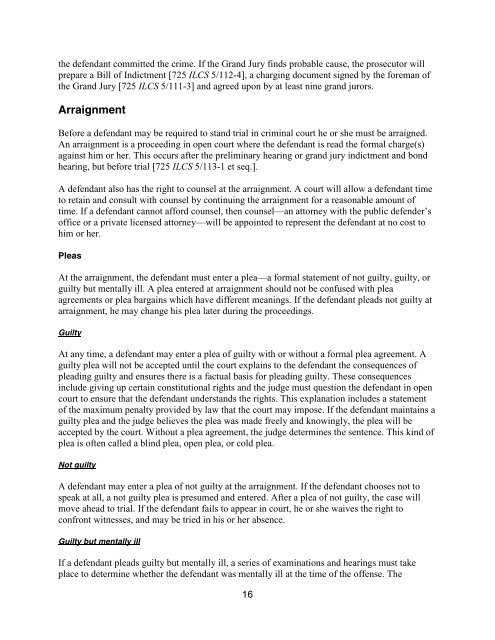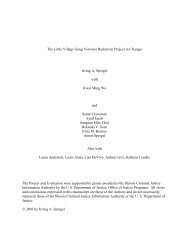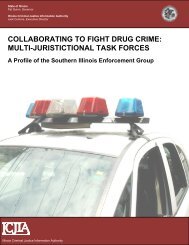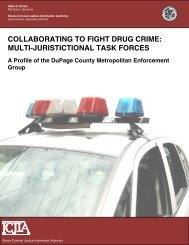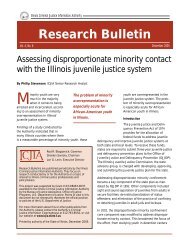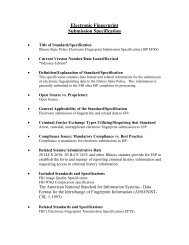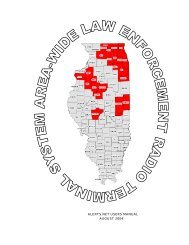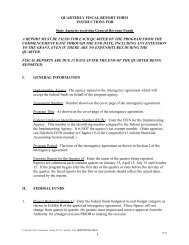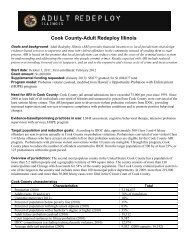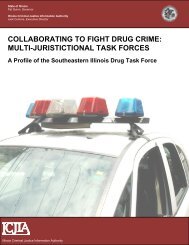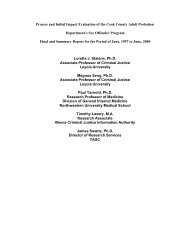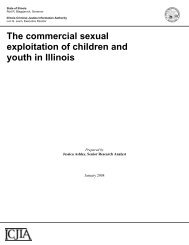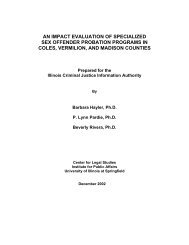policies and procedures of the illinois criminal justice system
policies and procedures of the illinois criminal justice system
policies and procedures of the illinois criminal justice system
You also want an ePaper? Increase the reach of your titles
YUMPU automatically turns print PDFs into web optimized ePapers that Google loves.
<strong>the</strong> defendant committed <strong>the</strong> crime. If <strong>the</strong> Gr<strong>and</strong> Jury finds probable cause, <strong>the</strong> prosecutor will<br />
prepare a Bill <strong>of</strong> Indictment [725 ILCS 5/112-4], a charging document signed by <strong>the</strong> foreman <strong>of</strong><br />
<strong>the</strong> Gr<strong>and</strong> Jury [725 ILCS 5/111-3] <strong>and</strong> agreed upon by at least nine gr<strong>and</strong> jurors.<br />
Arraignment<br />
Before a defendant may be required to st<strong>and</strong> trial in <strong>criminal</strong> court he or she must be arraigned.<br />
An arraignment is a proceeding in open court where <strong>the</strong> defendant is read <strong>the</strong> formal charge(s)<br />
against him or her. This occurs after <strong>the</strong> preliminary hearing or gr<strong>and</strong> jury indictment <strong>and</strong> bond<br />
hearing, but before trial [725 ILCS 5/113-1 et seq.].<br />
A defendant also has <strong>the</strong> right to counsel at <strong>the</strong> arraignment. A court will allow a defendant time<br />
to retain <strong>and</strong> consult with counsel by continuing <strong>the</strong> arraignment for a reasonable amount <strong>of</strong><br />
time. If a defendant cannot afford counsel, <strong>the</strong>n counsel—an attorney with <strong>the</strong> public defender’s<br />
<strong>of</strong>fice or a private licensed attorney—will be appointed to represent <strong>the</strong> defendant at no cost to<br />
him or her.<br />
Pleas<br />
At <strong>the</strong> arraignment, <strong>the</strong> defendant must enter a plea—a formal statement <strong>of</strong> not guilty, guilty, or<br />
guilty but mentally ill. A plea entered at arraignment should not be confused with plea<br />
agreements or plea bargains which have different meanings. If <strong>the</strong> defendant pleads not guilty at<br />
arraignment, he may change his plea later during <strong>the</strong> proceedings.<br />
Guilty<br />
At any time, a defendant may enter a plea <strong>of</strong> guilty with or without a formal plea agreement. A<br />
guilty plea will not be accepted until <strong>the</strong> court explains to <strong>the</strong> defendant <strong>the</strong> consequences <strong>of</strong><br />
pleading guilty <strong>and</strong> ensures <strong>the</strong>re is a factual basis for pleading guilty. These consequences<br />
include giving up certain constitutional rights <strong>and</strong> <strong>the</strong> judge must question <strong>the</strong> defendant in open<br />
court to ensure that <strong>the</strong> defendant underst<strong>and</strong>s <strong>the</strong> rights. This explanation includes a statement<br />
<strong>of</strong> <strong>the</strong> maximum penalty provided by law that <strong>the</strong> court may impose. If <strong>the</strong> defendant maintains a<br />
guilty plea <strong>and</strong> <strong>the</strong> judge believes <strong>the</strong> plea was made freely <strong>and</strong> knowingly, <strong>the</strong> plea will be<br />
accepted by <strong>the</strong> court. Without a plea agreement, <strong>the</strong> judge determines <strong>the</strong> sentence. This kind <strong>of</strong><br />
plea is <strong>of</strong>ten called a blind plea, open plea, or cold plea.<br />
Not guilty<br />
A defendant may enter a plea <strong>of</strong> not guilty at <strong>the</strong> arraignment. If <strong>the</strong> defendant chooses not to<br />
speak at all, a not guilty plea is presumed <strong>and</strong> entered. After a plea <strong>of</strong> not guilty, <strong>the</strong> case will<br />
move ahead to trial. If <strong>the</strong> defendant fails to appear in court, he or she waives <strong>the</strong> right to<br />
confront witnesses, <strong>and</strong> may be tried in his or her absence.<br />
Guilty but mentally ill<br />
If a defendant pleads guilty but mentally ill, a series <strong>of</strong> examinations <strong>and</strong> hearings must take<br />
place to determine whe<strong>the</strong>r <strong>the</strong> defendant was mentally ill at <strong>the</strong> time <strong>of</strong> <strong>the</strong> <strong>of</strong>fense. The<br />
16


